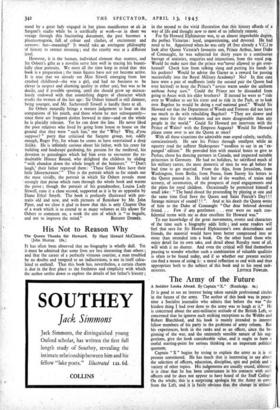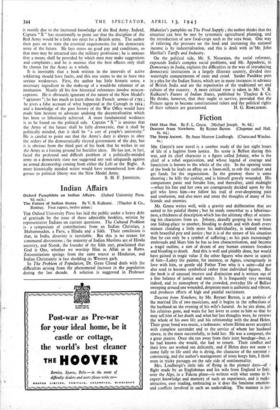The Army of the Future
A Soldier Looks Ahead. By Captain "X." (Routledge. 6s.) Ir is good to see an interest being taken outside professional circles in the future of the army. The author of this book was in peace- time a Socialist journalist who admits that before the war " the kindest thing I had ever done to the army was to laugh at it." He is concerned about the anti-militarist attitude of the British Left, so concerned that he ignores such striking exceptions as the Webbs and Robert Blatchford, and his book is mainly intended to interest fellow members of his party in the problems of army reform. But his experiences, both in the ranks and as an officer, since the be- ginning of the war, and the eminently sensible nature of his sug- gestions, give the book considerable value, and it ought to form a useful starting-point for serious thinking on an important politicai question. Captain " X " begins by trying to explain the army as it is at present constituted. He has much that is interesting to say about the selection of officers, education, discipline, spit and polish and a variety of other topics. His judgements are usually sound, although it is clear that he has been unfortunate in his contacts with staff officers and he does not appear to have heard of the Staff College. On the whole; this is a surprising apologia for the Army to come from the Left, and it is fairly obvious that the change in attitude is mainly due to the increased knowledge of the Red Army. Indeed, Captain " X " has occasionally to point out that the discipline of the Red Army would be a little too strict for a British army. The author then goes on to state the essential requirements for the democratic army of the future. He lays stress on good pay and conditions, so that men may be attracted into the military profession; is anxious that a means shall be provided by which men may mae suggestions
and complaints; he is anxious that the best officers only shall be chosen for te Army as a whole.
It is inevitable that a book written in the intervals of active soldiering should have faults, and this one seems to me to have two serious weaknesses. First, the author has little historic sense, a necessary ingredient in the make-up of a would-be reformer of an institution. Nearly all his few historical references involve miscon- ceptions. He is obviously ignorant of the nature of the New Model's " agitators "; he has much to learn about the French armies of 1793 ; he gives a false account of what happened at the Curragh in 1914 ; and a knowledge of the past history of the War Office would have made him hesitate to advocate undoing the decentralisatibn which has been so laboriously achieved. A more fundamental weakness is to be found on the political side. Captain " X " is anxious that the Army of the future shall be fully democratic, that it shall be politically minded, that it shall be " a sort of people's university." He is careful to point out that the Army's duty is always to obey the orders of the democratically elected government of the day, but it is obvious from the third part of his book that he wishes to see the Army as a forcing ground for Socialist ideas. He has not, in fact, faced the profound and difficult problem of a politically-minded army in a democratic state nor suggested any real safeguards against an armed dictatorship coming from either the Left or the Right. A more historically minded writer would have remembered how dan- gerous to political liberty was the New Model Army.
S. H. F. JOHNSTON.



























 Previous page
Previous page